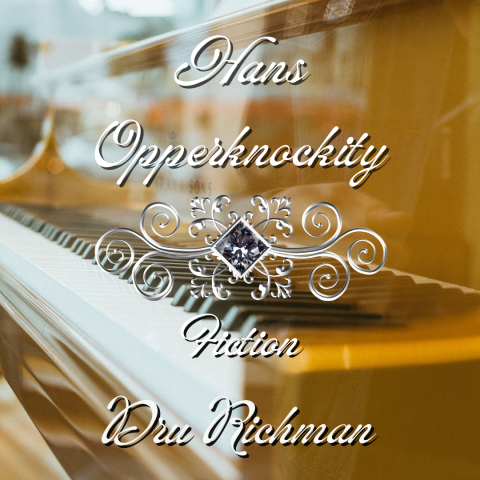Hanson Opperknockity

Image by Diane Deaner from Unsplash
By the time Hanson Opperknockity, who in later years would always be called Hans, was three, he was on the verge of mastering Bach’s Two and Three Part Inventions for the piano. By the time he was four, he was playing Mozart’s concertos better than anyone else, save Mozart himself. But at six years, that all came to an abrupt stop. He went to his father, Mikel, and announced that the piano was broken.
“Broken!” exclaimed his father rising from his chair where he had been reading the daily news.
Mikel walked to the music room and gave the piano a quick look-over. It appeared as it always had, which is to say, beautiful. The three-legged monster, as Mikel’s wife called it, sat proudly in all its ebony glory in the room.
“What’s broken, Hans?” he asked.
Young Hans climbed onto the piano bench and struck the G-sharp note two octaves above middle C. Mikel looked at his son with a perplexed look.
“Can’t you hear it?” Hans asked. “The sound is not right. The notes are beating each other up.”
Knowing that the piano had just been tuned that very afternoon, Mikel asked, “Are there any other notes that are ‘broken’?”
Hans scrunched up his face and then plucked the piano keys from the very lowest bass notes to the delicate high notes. In all, he picked six other notes that were ‘broken’. Mikel told Hanson that the piano tuner had been there that afternoon but that he would call him and arrange for him to return and make sure that Hanson was there to “help” the tuner.
And so began the amazing career of Hanson Opperknockity.
Over the next several years, Hanson honed his skills not only at tuning pianos but also seeing to their well-being. He learned how to regulate the mechanical parts of the keyboard action to make the keys more responsive. He discovered how to use a fine-tuned fork to prick the hammers to adjust their hardness. He learned to adjust the strings to produce their best tones. But, most importantly, he learned to listen to what the piano said.
Before he started tuning, he would sit for at least ten minutes – and sometimes longer, much longer – with his hand lightly resting on the soundboard. He would breathe the air that the piano breathed. He could hear what the piano heard. He got a feel for the room’s temperature and humidity. And he would listen. Only then would he lay out his tools and start to tune.
This communing with the piano was but one of many a joke in the Terre Haute piano-tuning community. The other being that Hans never, ever, re-tuned a piano. He lived by the words that his father had taught him, “If you don’t have time to do it right the first time, when will you find time to do it right the second?”
Fortunately for Hans, his clients and their pianos, re-tuning was never an issue. When Hans had done his magic, he would tell his clients when the piano would need to be tuned again. Some asked him how he knew. He always said to them that the piano told him. They just shrugged it off as his quirkiness and great skill.
By the time he was fifteen, he was tuning many of the upper level grand pianos in and around Terre Haute, as well as many of the grands at the University of Indiana. That summer he received a call that would, once again, change the course of his life.
Hans picked up the ringing phone in the kitchen.
“Hello?” said the voice, “I’m calling to speak with Hanson Opperknockity.”
“Speaking,” replied Hans.
“Mr. Opperknockity, this is James Blumenthal. I’m the business manager for the Chicago Symphony and I have been referred to you by Dean Whitherspoon at the University of Indiana.”
“Yes?” Hans answered.
“Mr. Opperknockity, we’re having a terrible problem with one of our Steinway Ds,” remarked Blumenthal. “No matter what any of our regular tuners have done, it continues to sound poorly. I was wondering if I could persuade you to come to Chicago and give us a hand.”
“What seems to be the problem?” asked Hans.
They spoke for the better part of 30 minutes. Hans peppered Blumenthal with questions about the piano, the hall, who would be playing the concert, and what music they would be playing and so on. When they hung up, they had agreed on a course of action, a date, and a fee. Mikel Opperknockity was only too happy to shuttle his son up to Chicago.
Blumenthal met father and son in the Symphony’s lobby. “Hanson Opperknockity?” said Blumenthal extending a hand towards Mikel.
“That would be me,” chimed Hans.
“But you’re so youn… A pleasure to meet you, sir,” said Blumenthal, quickly correcting himself. “I’ve heard so much about you and your skills.”
As they shook hands Blumenthal led both father and son towards the concert hall. “Let me take you to see the patient.”
They entered through the side entrance of the concert hall. Hans saw the 9-foot piano sitting forlornly on the stage. “I’ll need a little time with him,” said Hans. “I’ll come to you when I’m done.”
About forty-five minutes later, Hans found his father and Blumenthal speaking in Blumenthal’s office.
“He says he’s always cold,” Hans commented. “And it’s a bit too dry on the stage. Is there any way that environmental services can relieve that?”
“I’ll see what I can do,” said Blumenthal as he jotted down notes. “Anything else?”
“Well, if you want the folks in box D4 to really be able to hear and enjoy the concerts, you’ll need to reposition the grand upstage by nine inches and stage left by three and three-quarters inches.”
Blumenthal looked up abruptly. D4 was the worst seat in the house. Everyone always complained that they could never hear the piano from that box. How did this… boy know that?
“Done!” said Blumenthal.
“Well, OK, then. I’ll get my tools and get to work,” said Hans cheerfully.
“How long are you gonna be, son?” asked Mikel.
Hans closed his eyes and did some internal calculations and replied, “Probably twelve, maybe fourteen hours, dad.”
“OK,” said the senior Opperknockity. “Call me at the hotel when you’re done.”
True to form, Hans finished about fourteen hours later, packed up his tools, picked up his paycheck, thanked James Blumenthal, called his dad at the hotel and, after they ate, returned immediately to Terre Haute.
A few days after the most successful concert in the history of the Chicago Symphony, Blumenthal spoke with his counterpart, Ron Sudder, in New York City.
“Ron, the kid is unbelievable! First, he comes in and just sits with the piano for a half-hour, forty-five minutes. Then he tells me that the ‘piano says it’s too cold.’ Geez. After that, he tells me that the spot where we’ve placed that piano on stage for the past thirty years is wrong and that we’ve got to move it if we want to get the best sound. So, I figure, what the hell? In for a penny, in for a pound, right? I do all that. And sonofabitch, the kid was right! I sat in D4, the black hole seat, you know the one I told you about, just to see if the kid was full of shit or what. Ron, I’ve never heard that piano sound better and I’ve been here for over twenty years. Crap! That’s longer than that kid’s been alive.” They spoke for a few more moments and then Blumenthal was called away to more pressing matters.
Two years later Ron Sudder was having a bad day. His third piano tuner in fourteen months had stormed out of the hall in a drunken rage vowing never to return, along with some expletives about Sudder’s ancestry. That damned Imperial Bösendorfer was more trouble than it was worth. And now he’d have to find yet another tuner to work on it. And this, just a fortnight before the most important concert ever given in Carnegie Hall. Then he remembered the conversation he had with Jamie Blumenthal two years earlier, called him up, and got the kid’s number.
The conversation between Sudder and Hans was similar to that of Hans and Blumenthal.
“Mr. Opperknockity, this is Ron Sudder,” he began. “I’m with Carnegie Hall and I’ve got a real problem with our Imperial and I hope you can help us out.”
Sudder explained his tuner problem and his time problem. Like Hanson’s earlier conversation with Blumenthal, they spoke for the better part of thirty minutes. Hans learned that Van Cliburn, himself, would be playing and that he would recreating his 1958 Moscow concert and would be playing Tchaikovsky’s Piano Concerto No. 1 and Rachmaninoff’s Piano Concerto No. 3 in just three weeks. When they hung up, they had agreed on a date for Hanson to fly to New York City, and a very sizable fee.
Two days later Hans, having completed his preliminary “talk” with the nine-foot, six-inch behemoth, was in Sudder’s office.
“I can see why you’ve been having so much trouble with her,” said Hans.
“Her?” questioned Sudder.
“The Imperial,” explained Hans. “She’s in a lot of pain. Apparently, about ten years ago the roller on her bass-side leg caught an imperfection in the stage floor and fractured her leg. It was a hairline crack then, but it’s gotten worse as she’s gotten older. I’ll need to fix that immediately. You’ll also need to order these two bass strings and these nine treble strings,” Hans said, passing over a slip of paper with the strings’ names and numbers. “The bass strings are fraying. I’m surprised that no one has noticed that they buzz every time the notes are struck. And the three treble notes will most certainly break during either the rehearsal or the performance of the two pieces that Mr. Cliburn will be playing,” continued Hans.
Hans looked at his watch and suggested that if Sudder called Bösendorfer to order the strings now and had them FedExed overnight, he’d have them tomorrow. In the meantime, he’d start the repairs on the Imperial’s broken leg.
“Oh, one other thing,” Hans remembered. “She says she has a knot in her rim about sixteen inches from the curve and about three inches down that’s really bothering her. Sorta like a pebble in one’s shoe. It’s obviously an imperfection in the case that Bösendorfer will have to fix. But the sooner the better.”
Sudder, completely taken aback, could only reply “OK, I’ll get on it.”
“Great,” exclaimed Hans. “I’ll get to work on her leg.”
It took nine days to repair the lady’s leg and re-string her notes, and then four more days to bring her up to a condition that surpassed even Bösendorfer’s exacting standards for an Imperial. And true to form, when he was done, Hans packed up his tools, picked up his paycheck, thanked Ron Sudder, and returned immediately to Terre Haute.
Two days later, Van Cliburn sat down at the Lady Rose, as she was now being called, and began the Tchaikovsky. Suddenly, he stopped and struck the G-sharp note two octaves above middle C. Once, twice, three times – listening closely after each sounding of the note. And then the same treatment for the B-flat three octaves below middle C. A very unhappy Cliburn walked into Sudder’s office.
“There are two notes on the piano that are out of tune. You’ll have to call the tuner back and have him re-tune the piano.”
Sudder, shaking his head in amazement, pulled out an envelope and handed it to Cliburn saying, “The tuner said you’d say that. He left you this.”
Cliburn opened the envelope and read the hand written note:
“Dear Maestro.
As you’ve probably heard, both the G-sharp and the
B-flat are ‘wrong’. Wrong, now. But after you rehearse the Tchaikovsky, the G-sharp will relax just a tenth of a centimeter and will be perfectly tuned. The B-flat is a bit flat. But after you rehearse the Rachmaninoff, when the string is warm, it will tighten up just enough to bring it into complete tuning. Had I tuned it in a more conventional manner, the G-sharp would be even sharper and the B-flat flatter during the performance. And I couldn’t allow that.
Thank you for your patience and have a great concert.
Yours truly,
Hanson Opperknockity”
Van Cliburn looked at the page incredulously and then at Sudder. “I don’t give a damn!” he exclaimed. “Get him back here to re-tune the piano.”
“I can’t do that,” said Sudder.
“And why not?” demanded Cliburn.
“Because,” responded Sudder, “everybody knows; Opperknockity only tunes once.”
Need more great fiction? Check out these pieces from the MockingOwl Roost staff and contributors.
- Like Father, Like Son
- The Book
- Utterance
- Hail to the Chief
- Princess Piano Box Full of Teeth
- Too Pointless
- His Paradise Lost
- Wolfskin
- Squirrel
- Selling Books

Dru Richman
Dru’s a little older and a lot grayer but still pushing on. The winner of the first National Public Radio’s Selected Shorts Writing Contest, Mr. Richman’s work has also won contests at Writers of the Future, National Novel Writing Month, and has been featured in Writers and Readers’ Magazine, Blank Cover Press, The Lawrence House Centre for the Arts – Uproar Literary Magazine, Synkroniciti Magazine, Across the Margin Magazine, Adelaide Literary Magazine, and other journals and anthologies. Dru lives in Richardson, Texas (a suburb of Dallas), with wifey Ava, and their four-legged love child, a standard poodle named Jacob.





5 Comments
[…] Hans Opperknocity – Fiction […]
[…] Hanson Opperknockity – short story […]
[…] Hanson Opperknockity – Short story […]
[…] Hans Opperknockity […]
[…] Hans Opperknockity […]